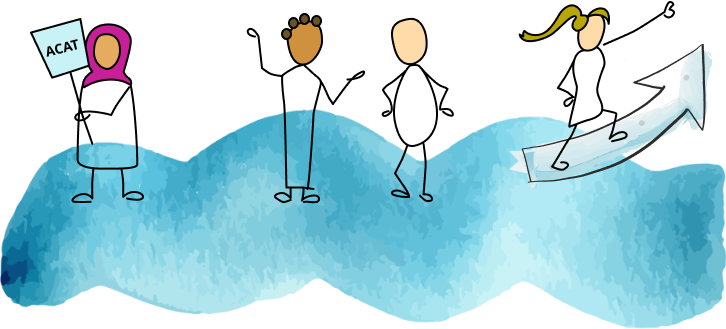

ACAT is committed to celebrating diversity and all the strengths this can bring to society, to communities and organisations and to our own thinking. As an organisation we are also committed to working towards the ending of discrimination of any kind. The organisation is mindful of both advantage and disadvantage and their impact on life chances and opportunity. The CAT model of therapy includes the way social advantage and disadvantage, ability and disability, and being part of majority groups and minoritised groups, can impact on how people feel about themselves and how they experience the world.
As an organisation, we are committed to recognising and addressing systemic bias across a range of areas, and embedding equity and inclusion across all parts of the organisation. This includes in our practice, our policies and protocols, and in the support that we offer to trainees, practitioners and to those who seek CAT therapy.
We describe different aspects of this commitment in the sections below.
As an employer and training provider, ACAT is also bound by the 2010 Equalities Act that assures people that they will not be discriminated against on the basis of nine “protected characteristics”:
age
disability
gender reassignment
marriage and civil partnership
pregnancy and maternity
race
religion
sex, and
sexual orientation.
The Act highlights different forms of discrimination, some of which are overt and unambiguous while others are more inadvertent and unintentional.
Central to Cognitive Analytic Therapy is the development of the reflective ‘observing eye’ in response to ‘fast brain’ quick responses to others. These tend to occur largely unconsciously. Instant internal responses lead to enormous diversity in the way we each see other and the world. These processes can take place even when we are part of the same social group.
Discrimination occurs when these processes lead to a powerful critical, hostile or evaluative response to the ‘category’ in which we place someone. Expressions of such responses can include attitudes, actions or verbal generalisations. These may be powerful and explicit, or more subtle. Generalisations can resonate with others and form the foundation of prejudice. This leads to a powerful rejection of people who share certain features. Discrimination can also reproduce and perpetuate through systems and practices.
It is vital to find a way to challenge these prejudices and forms of discrimination. A CAT perspective on this process would centre opposition to prejudice and discrimination in a reflective place. By remaining reflective we are more able to develop an understanding of how prejudices form and survive. We can then more easily resist becoming fixed in a judgemental or closed position.
A core part of our work as therapists is to be aware of our own unconscious responses and biases. By doing so we better equip ourselves to help our patients become reflective about their own. A feeling of equality and openness with the other helps to expand our curiosity about the difficulties with which they are struggling. This helps us to remain in dialogue with the other, rather than arriving at quick answers or suggestions, or feeling overwhelmed.
ACAT’s Equality, Diversity and Inclusion Committee (EDIC) is a sub-committee of the Board of Trustees and Council of Management.
You can read the EDIC's Terms of Reference here.
The current Chair of the EDIC is Dupe Adu-White. A number of other ACAT members support Dupe in her role, and the EDIC actively favours the inclusion of multiple voices as we conduct this work.
If you would like to find out more about the work of the EDIC, or would like to become involved in this work in any way, please contact us through the ACAT administration team.
ACAT encourages all its members to take advantage of opportunities for CPD around issues of equality, diversity and inclusion. As a member of UKCP's HIPC college, ACAT supports their recommendation that "a minimum of 5% CPD training hours should be devoted to EDI per year for any practitioner, but especially for those in a position of responsibility for teaching or supervising students."
Relevant training and CPD could relate to:-
Protected characteristics as identified by equalities legislation, such as
and additionally
EDIC members facilitate an open forum at each of ACAT's annual conferences and have also helped to lead on other CPD events. One of the first of these was a day conference in London in November 2019. This brought together interested members on the theme of Beyond Aims In/Equality: Embedding Thinking Space & Action in CAT Training & Practice/
Since 2020 EDIC has also co-organised regular Black History Month events alongside ACAT's Inequality and Diversity SIG. Going forward we hope to be able to support events celebrating other aspects of identity and context.
ACAT's Equality and Diversity Policy has grown and developed since its first draft in 2010. You can read it by visiting its dedicated page at this link.
 In July 2021 a group of over twenty ACAT members met to discuss the organisation’s commitment to anti-racist practice. They set out to create a statement together that described this.
In July 2021 a group of over twenty ACAT members met to discuss the organisation’s commitment to anti-racist practice. They set out to create a statement together that described this.
The resulting statement was shared amongst the membership and approved by our Board of Trustees on 8th October 2021. It continues to guide our organisation, our committees and our membership.
We acknowledge that racism exists in our society and our model was developed from within a Western Eurocentric culture. In accordance with our model this inevitably means that racist reciprocal roles will be enacted within our organisation, our trainings and by our members, whether done in awareness or not. We commit as an organisation to maintain dialogue with ourselves, each other and with others who are not ACAT members, even when it is painful or difficult, with the aim of growing an ever-widening understanding of what it is to be human, and to decrease the malign influence of power dynamics wherever they exist.
One way we have embedded EDI considerations within ACAT is by offering an informal support system for members which is co-ordinated by the Chair of EDIC.
The informal support system set up by EDIC aims to provide a safe space whereby members can receive informal support and discuss difficulties around inequalities.
This support system is not intended as an alternative to more formal channels of support, such as through raising a more formal concern or complaint through ACAT's Ethics Committee.
Members can send equality and diversity queries direct to the Chair of EDIC via chair.edic@acat.org.uk Please put ‘E & D Query’ in the subject line.
The EDIC Chair or another member of the committee aims to respond to emails within 72 hours, although it may take longer to respond if emails are sent over the weekend. When making contact please give your name, and preferred contact details.
If you email seeking support from the EDIC system, your confidentiality will be held with the highest regard. However in order to support the you effectively it may be necessary to share your concerns with other members of the EDI committee. If this is the case, we will seek your consent to do so at the time of contact. The EDIC Chair and any other members involved will only keep your contact details or correspondence with your consent, and until you no longer need support for that difficulty.
When you request advice using this system you will need to complete the required fields and supply some contact information. By doing so you give us your consent to process your personal data for the purposes of assisting you or answering your questions. Please do not identify any third parties that you may refer to; please ensure their identity remains confidential.
We will protect any information you give us in accordance with our data protection polices which are available in our privacy policy below. We will only share your details for professional or legal reasons and in relation to your request for advice. Your data will not be kept for any longer than is necessary to answer your query. We do not keep a record of enquiries to our informal support line.
For further details please click here to go to ACAT’s Privacy Notice
ACAT supports and links with a number of Special Interest Groups (SIGs) for members and friends of ACAT. Several of these are relevant to different aspects of equality and diversity; for example:- Intellectual Disability, and young people (Youth CAT SIG). One is a dedicated SIG on Inequality & Diversity.
This group is a forum where members can share, discuss and explore issues related to diversity and inequality, and how these constructs impact on clinical work. It aims to support and enhance members’ clinical skills. The first thirty minutes of each meeting are for general discussion and a further hour focusses on a clinical discussion. It meets three times a year.
It is separate and independent from committees within ACAT (including the EDIC). However it may plan future projects with the aim of raising awareness, offering support, training and feedback to those committees. The SIG is currently co-ordinated and facilitated by Jessie Emilion.
Any ACAT member with an interest in this area is eligible to join the Inequality & Diversity SIG. To join, complete your details on the Inequality and Diversity SIG contact form.
You can see details of other ACAT Special Interest Groups at this link
As an ACAT member you can access a range of resources to help you maintain inclusive and non-discriminatory practice. Members can access a curated list of CAT articles organised under different protected characteristics headings, through a members-only page at Member Resources - Equality, Diversity and Inclusion
If you have suggestions for other articles and resources to include, please contact us through the Administration Team for the attention of EDIC.
The publication CAT and the Politics of Mental Health is another key source of information about a CAT perspective on inequalities.
ACAT is a member of UKCP’s Humanistic and Integrative Psychotherapy College (HIPC). Its Equality Diversity & Intersectionality (EDI) Committee published Guidance on Teaching Equality, Diversity and Intersectionality in HIPC Training Organisations in 2020. These have informed ACAT’s developing policies and training content around equality and diversity issues.
In October 2023 the EDI Coalition published a Toolkit designed to help the UK counselling and psychotherapy sectors better understand and address race and diversity. You can download a free copy of this, entitled 'Race is Complicated: a toolkit for psychological therapies training' by clicking on this link.